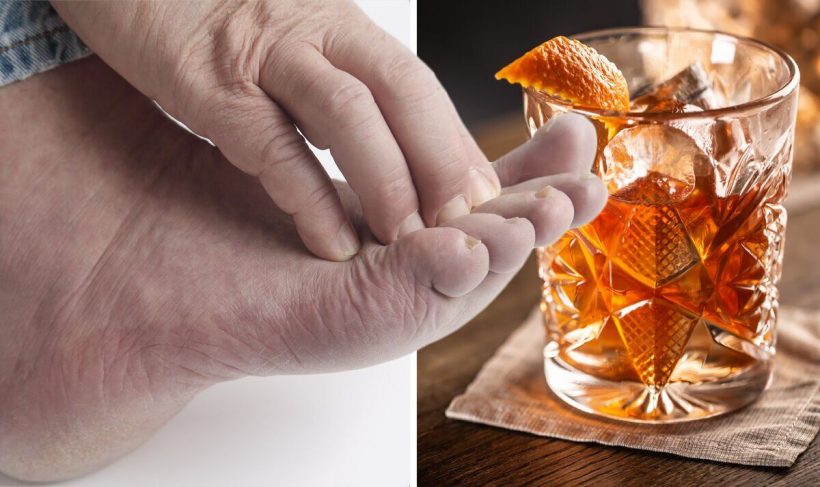This Morning: Dr Zoe explains ulcers after coffee and alcohol
We use your sign-up to provide content in ways you’ve consented to and to improve our understanding of you. This may include adverts from us and 3rd parties based on our understanding. You can unsubscribe at any time. More info
Drinking adversely affects health, but a large portion of the population continues to do it in excess. While even the occasional tipple can cause harm, the risks grow graver over time. Peripheral neuropathy, a condition widely associated with diabetes or nutritional deficiencies, is one of many complications linked to prolonged alcohol consumption. As the nerves throughout the body become damaged, sufferers may notice changes in their voices.
The development of the disease is a risk for people with a history of chronic consumption of large volumes of alcohol.
Doctor Sharhrukh Mallik, a doctify-reviewed neurologist, explained: “Ethanol – the alcohol in alcoholic drinks 0 is primarily treated as a toxin by the body, with about 80 percent metabolised by the liver.
“The remaining 20 percent affects the neurological system. This includes the brain, which leads to the initial pleasant symptoms of reduced social inhibition, but with continued consumption also to the less pleasant symptoms of being intoxicated or drug.”
In the majority of cases, the development of symptoms is insidious and prolonged, but some cases can be characterised by rapid onset.
READ MORE: High cholesterol: NHS says avoiding binge drinking may help ‘reduce’ levels

What’s more, most people develop alcohol-related peripheral neuropathy after a lifetime of consuming alcohol, exceptions are common.
“Over many years of alcohol consumption, there is a cumulative effect of damage to the peripheral nerves,” noted Doctor Mallik.
“The development of peripheral neuropathy is related to the total lifetime exposure to ethanol. What this means is if someone drinks heavily, it will take less time for the neuropathy to develop.
“However, prolonged consumption over decades at what would be considered moderate doses can also lead to peripheral neuropathy, and this is something that often surprises my patients when I see them in the clinic.”
Signs of nerve damage typically initiate with numbness or tingling in the toes, which gradually spreads to the foot, and eventually the lower legs.
“Alcohol-related peripheral neuropathy rarely progresses to above the knees, but other causes of neuropathy can,” noted Doctor Mallik.
As with other types of neuropathy, the pins and needles can also be felt in the fingers and hands, but this is less common with alcohol-related neuropathy.
What’s more, patients will not just experience sensory manifestations but in rare cases, might also notice changes to their voices.

This happens if the vagus or recurrent laryngeal nerve becomes damaged, causing the voice to weaken, or become hoarse.
How is alcohol-related neuropathy treated?
Although alcohol-related neuropathy isn’t life-threatening, it can severely impact the quality of life, with extreme cases leading to severe disability.
“It is also worth noting that alcohol has a particular predilection to damaging the cerebellum, which is the coordination centre in the brain- this can lead to symptoms of slurred speech, as well as being off-balance,” added Doctor Mallik.
“If someone has these symptoms, they should have their blood checked for common causes and be referred to a Neurologist for clinical assessment and subsequently have neurophysiological tests of the nerve in their hands and feet to make the diagnosis.

Treatment for such cases usually targets the rehabilitation of the peripheral nerves, but advanced nerve damage can become irreversible.
Unlike other forms of peripheral neuropathy, such as diabetic neuropathy, the alcohol-related condition rarely requires amputation.
Doctor Mallik explained that while severe neuropathy may potentially hasten the need for amputation – it would not be the main contributor.
“There is no intrinsic risk of requiring amputation with alcohol-related peripheral neuropathy,” noted the expert.
Source: Read Full Article
